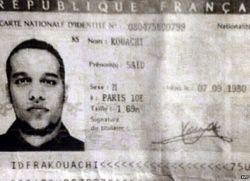Difference between revisions of "Lost and Found ID"
| Line 40: | Line 40: | ||
==Documents that survived fiery plane crashes== | ==Documents that survived fiery plane crashes== | ||
| − | One might that | + | One might think that fiery plane crashes would destroy fragile documents such as passports or credit cards, especially if the plane's black boxes were never recovered. If so, one would be surprised by some recent {{on}}s. |
===September 11, 2001=== | ===September 11, 2001=== | ||
Revision as of 12:53, 5 February 2019
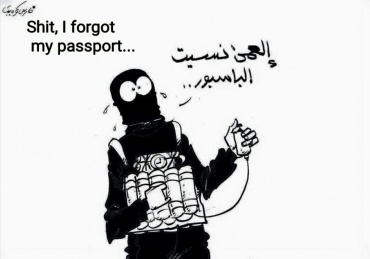 | |
| Type | pattern |
| A recurring theme in deep events, whereby the perpetrators supposedly leave behind them a trail of very revealing information such as identity documents. | |
The Lost and Found ID syndrome is a simple, if sometimes highly improbable, trail of identifying documents. A commonly feature in cases of "watershed violence", it might have been for investigators to pick up on. As Russ Baker noted in 2015, this allows easy parallel construction to ID "lone nuts" - facilitating false flag events by minimizing time spent time available for reflection on possible perpetrators.[1]
Contents
Classic Examples
JFK Assassination
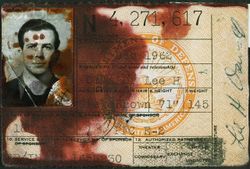
- Full article: JFK/Assassination
- Full article: JFK/Assassination
Lee Harvey Oswald, the supposed "lone nut" killer of John F. Kennedy purportedly dropped his wallet, which was found at the murder scene of J. D. Tippit. This story was soon revised to claim that the police took the wallet from him after he was arrested.
MLK Assassination
- Full article: MLK/Assassination
- Full article: MLK/Assassination
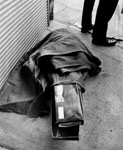
James Earl Ray, the supposed "lone nut" killer of Martin Luther King had escaped from a prison shortly before the attack, reportedly panicked and dropped a bundle of items on the sidewalk to be found later - including his rifle, binoculars, clothing, prison radio, and a newspaper clipping revealing where King would be staying.
2001 Mexican legislative assembly attack
- Full article:
 2001 Mexican legislative assembly attack
2001 Mexican legislative assembly attack
- Full article:
A month after 9-11, two Israelis were arrested in the Mexican Legislative assembly in what appears to have been a failed false flag attack. As well as carrying pistols, a hand grenade and dynamite, they were reported to have been in possession of Pakistani passports.[2] After "very high level emergency meetings" between "Mexican Secretary of Foreign Relations Jorge Gutman, General Macedo de la Concha and a top Ariel Sharon envoy" they were released without charge.[3]
Recent examples
The pattern of ID papers helping authorities to pin down suspects continues.[4]
Charlie Hebdo, 2015
Said Kouachi, a supposed perpetrator of the Charlie Hebdo attack left his identification card in the abandoned getaway car.[5]
2015-11 Paris attacks
The Independent reported that "A Syrian passport has been found on the body" of one of the suicide bombers who committed the 2015-11 Paris attacks.[6] Al Jazeera "spoke to explosives and forensic experts, who offered an explanation for how a paper document could survive a suicide blast despite close proximity to the bomber."[7] German Interior Minister Thomas de Maiziere stated that "There are indications that this was a planted lead, but it still can’t be ruled out that this was indeed an IS terrorist posing as a refugee".[8]
2016 Berlin truck attack
After the 2016 truck attack in Berlin, a "German security official" told CNN that the suspect was known to the authorities and had been arrested for use of forged documents on his way to Italy but was released. CNN reported that "The suspect’s identity papers were found inside the truck."[4]
2017 Barcelona attack
Driss Oukabir was arrested after his passport and ID discovered at the scene of the 2017 Barcelona attack. He stated that they had been stolen.[9]
Documents that survived fiery plane crashes
One might think that fiery plane crashes would destroy fragile documents such as passports or credit cards, especially if the plane's black boxes were never recovered. If so, one would be surprised by some recent official narratives.
September 11, 2001
- Full article:
 9-11
9-11
- Full article:
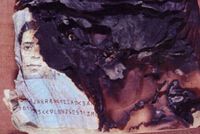
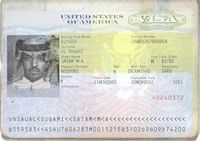
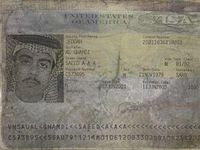
Three of the 19 hijackers' passports supposedly survived the fiery crashes of the planes which took their lives on 9-11. In New York, Satam al-Suqami and in Pennsylvania Ziad Jarrah and Saeed al-Ghamdi. No explanation has been proffered for how a passport could survive a crash which purportedly destroyed all the planes black boxes. FBI agent A. Todd McCall said the hijackers "thought their identification would be destroyed during the attacks," but, he added, "They were wrong."[10][11] The 4th and final passport that supposedly survived was that of Abdul Aziz al Omari, supposedly recovered from luggage that did not make it from a Portland flight to Boston on to the connecting flight which was American Airlines flight 11.[12]
TWA Flight 800
- Full articles: TWA Flight 800, Mohamed Samir Ferrat
- Full articles: TWA Flight 800, Mohamed Samir Ferrat
Mohamed Samir Ferrat was killed by the explosion of flight TWA 800. The New York Times reported in 1996 that "about a week after the crash" his credit card was used. It reported in explanation that "law enforcement officials said they believed that the credit card had probably washed up on the sand and was found by a beachcomber."[13]
Examples
| Page name | Description |
|---|---|
| Fake passport | |
| Mehamn Accident | Passenger plane that crashed because of actions of British fighter jet. The cause was covered up by 3 investigation committees, and is still not officially admitted. |
Related Quotation
| Page | Quote | Author | Date |
|---|---|---|---|
| 2010 United States diplomatic cables leak/Middle East | “You know better than I that we cannot deal with these people (the Guantanamo detainees). I can't detain them. If I take their passports, they will sue to get them back. I can talk to you into next week about building a rehabilitation center, but it won't happen. We are not Saudi Arabia; we cannot isolate these people in desert camps or somewhere on an island. We cannot compel them to stay. If they are rotten, they are rotten and the best thing to do is get rid of them. You picked them up in Afghanistan; you should drop them off in Afghanistan, in the middle of the war zone.” | Sabah Al-Ahmad Al-Jaber Al-Sabah Wikileaks | 2010 |
Rating
In deep events ID seems to survive even when none of the perpetrators do. The page collects the suspicious evidence of what Russ Baker calls "Lost and Found ID" syndrome.
References
- ↑ http://whowhatwhy.org/2015/02/01/lost-found-id-oddity-terror-cases-stupid-sinister/
- ↑ http://www.fpp.co.uk/online/01/12/Mexico2.html
- ↑ http://www.fpp.co.uk/BoD/Mossad/Mexico/151001.html
- ↑ a b http://whowhatwhy.org/2016/12/21/berlin-truck-terror-suspect-curious-matter-id-papers-left-behind/
- ↑ http://www.mirror.co.uk/news/world-news/charlie-hebdo-paris-shooting-three-4938972
- ↑ http://www.independent.co.uk/news/world/europe/paris-terror-attacks-syrian-passport-found-on-body-of-suicide-bomber-at-stade-de-france-a6734491.html
- ↑ http://www.aljazeera.com/news/2015/11/paris-attacks-give-rise-conspiracy-theories-151118093352559.html
- ↑ http://21stcenturywire.com/2015/11/18/media-duped-minister-admits-syrian-passport-likely-planted-at-scene-of-paris-attacks/
- ↑ https://www.theguardian.com/world/2017/aug/18/terror-timeline-of-barcelona-and-cambrils-attacks-and-other-terror-raids
- ↑ Jeremy Boren, "Investigators Had to Improvise at Somerset County Crash Site." Pittsburgh Tribune-Review, September 4, 2011
- ↑ Paul Peirce, "Investigators Tell of Emotions Associated With United 93 Crash." Pittsburgh Tribune-Review, September 10, 2012.
- ↑ http://www.9-11commission.gov/archive/hearing7/9-11Commission_Hearing_2004-01-26.htm
- ↑ http://www.nytimes.com/1996/08/18/nyregion/quietly-officials-seek-clues-in-lives-of-flight-800-s-dead.html
